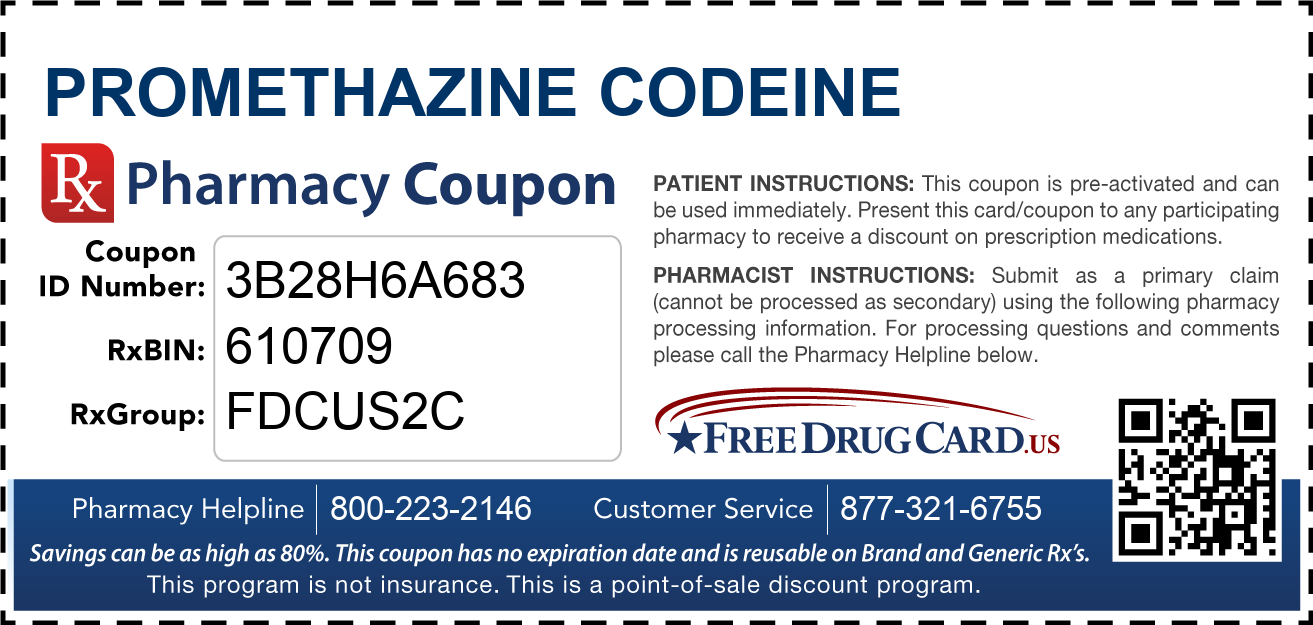Free Promethazine Codeine Discount Coupon
Print your free Promethazine Codeine coupon below and bring it into any of our 68,000 participating pharmacies including: Walgreens, CVS Pharmacy, Walmart Pharmacy, Rite Aid, Kroger, Kmart Pharmacy, and Safeway. This Promethazine Codeine coupon can help you save up to 90% on your medication costs! This pharmacy coupon is pre-activated, can be used immediately, and has no membership fees. Our Patient Assistance Program is completely free and open to everyone.

Send this coupon as a text message to your cell phone:
Before you text your coupon, Like us on Facebook!
Send this coupon as an email to your friends and family:
Before you email your coupon, Like us on Facebook!
STEP 1: Print or save your free drug coupon.
STEP 2: Bring it to your local pharmacy.
STEP 3: Save up to 90% on your prescriptions!
Promethazine Drug Information
- Why
- How
- Other Uses
- Precautions
- Special Dietary
- If I Forget
- Side Effects
- Storage Conditions
- Overdose
- Other Information
- Brand Names
Why is this medication prescribed?
Promethazine is used to relieve the symptoms of allergic reactions such as allergic rhinitis (runny nose and watery eyes caused by allergy to pollen, mold or dust), allergic conjunctivitis (red, watery eyes caused by allergies), allergic skin reactions, and allergic reactions to blood or plasma products. Promethazine is used with other medications to treat anaphylaxis (sudden, severe allergic reactions) and the symptoms of the common cold such as sneezing, cough, and runny nose. Promethazine is also used to relax and sedate patients before and after surgery, during labor, and at other times. Promethazine is also used to prevent and control nausea and vomiting that may occur after surgery, and with other medications to help relieve pain after surgery. Promethazine is also used to prevent and treat motion sickness. Promethazine helps control symptoms, but will not treat the cause of the symptoms or speed recovery. Promethazine is in a class of medications called phenothiazines. It works by blocking the action of a certain natural substance in the body.
How should this medicine be used?
Promethazine comes as a tablet and syrup (liquid) to take by mouth and as a suppository to use rectally.When promethazine is used to treat allergies, it is usually taken one to four times daily, before meals and/or at bedtime. When promethazine is used to relieve cold symptoms, it is usually taken every 4 to 6 hours as needed. When promethazine is used to treat motion sickness, it is taken 30 to 60 minutes before travel and again after 8 to 12 hours if needed. On longer trips, promethazine is usually taken in the morning and before the evening meal on each day of travel. When promethazine is used to treat or prevent nausea and vomiting it is usually taken every 4 to 6 hours as needed. Promethazine may also be taken at bedtime the night before surgery to relieve anxiety and produce quiet sleep. Follow the directions on your prescription label carefully, and ask your doctor or pharmacist to explain any part you do not understand. Take promethazine exactly as directed. Do not take more or less of it or take it more often than prescribed by your doctor.
Promethazine suppositories are for rectal use only. Do not try to swallow the suppositories or insert in any other part of your body.
If you are taking promethazine liquid, do not use a household spoon to measure your dose. Use the measuring spoon or cup that came with the medication or use a spoon made especially for measuring medication.
Other uses for this medicine
This medication may be prescribed for other uses; ask your doctor or pharmacist for more information.
What special precautions should I follow?
Before taking promethazine,
- tell your doctor and pharmacist if you are allergic to promethazine, other phenothiazines (certain medications used to treat mental illness, nausea, vomiting, severe hiccups, and other conditions) or any other medications. Also tell your doctor and pharmacist if you have ever had an unusual or unexpected reaction when you took promethazine, another phenothiazine, or any other medication. Ask your doctor or pharmacist if you do not know if a medication you are allergic to is a phenothiazine.
- tell your doctor and pharmacist what prescription and nonprescription medications, vitamins, nutritional supplements and herbal products you are taking or plan to take. Be sure to mention any of the following: antidepressants ('mood elevators') such as amitriptyline (Elavil), amoxapine (Asendin), clomipramine (Anafranil), desipramine (Norpramin), doxepin (Adapin, Sinequan), imipramine (Tofranil), nortriptyline (Aventyl, Pamelor), protriptyline (Vivactil), and trimipramine (Surmontil); antihistamines; azathioprine (Imuran);barbiturates such as phenobarbital (Luminal); cancer chemotherapy; epinephrine (Epipen); ipratropium (Atrovent)medications for anxiety, irritable bowel disease, mental illness, motion sickness, Parkinson's disease, seizures, ulcers, or urinary problems; monoamine oxidase (MAO) inhibitors such as isocarboxazid (Marplan), phenelzine (Nardil), tranylcypromine (Parnate), and selegiline (Eldepryl, Emsam, Zelapar); narcotics and other pain medication; sedatives; sleeping pills;and tranquilizers. Your doctor may need to change the doses of your medications or monitor you carefully for side effects.
- tell your doctor if you have or have ever had an enlarged prostate (a male reproductive gland); glaucoma (a condition in which increased pressure in the eye can lead to gradual loss of vision); seizures; ulcers; blockage in the passage between the stomach and intestine; blockage in the bladder; asthma or other lung disease; sleep apnea; cancer;any condition that affects the production of blood cells in your bone marrow; or heart or liver disease. If you will be giving promethazine to a child, also tell the child's doctor if the child has any of the following symptoms before he or she receives the medication: vomiting, listlessness, drowsiness, confusion, aggression, seizures, yellowing of the skin or eyes, weakness, or flu-like symptoms. Also tell the child's doctor if the child has not been drinking normally, has had excessive vomiting or diarrhea, or appears dehydrated.
- tell your doctor if you are pregnant, plan to become pregnant, or are breast-feeding. If you become pregnant while taking promethazine, call your doctor.
- talk to your doctor about the risks and benefits of taking promethazine if you are 65 years of age or older. Older adults should not usually take promethazine because it is not as safe as other medications that can be used to treat the same conditions.
- if you are having surgery, including dental surgery, tell the doctor or dentist that you are taking promethazine.
- you should know that this medication may make you drowsy. Do not drive a car or operate machinery until you know how this medication affects you. If you are giving promethazine to a child, watch the child to be sure he or she does not get hurt while riding a bike or participating in other activities that could be dangerous.
- ask your doctor about the safe use of alcohol while you are taking this medication. Alcohol can make the side effects of promethazine worse.
- plan to avoid unnecessary or prolonged exposure to sunlight and to wear protective clothing, sunglasses, and sunscreen. Promethazine may make your skin sensitive to sunlight.
What special dietary instructions should I follow?
Unless your doctor tells you otherwise, continue your normal diet.
What side effects can this medication cause?
Promethazine can cause side effects. Tell your doctor if any of these symptoms are severe or do not go away:
- dry mouth
- drowsiness
- listlessness
- difficulty falling asleep or staying asleep
- nightmares
- dizziness
- ringing in ears
- blurred or double vision
- loss of coordination
- nausea
- vomiting
- nervousness
- restlessness
- hyperactivity
- abnormally happy mood
- stuffy nose
- itching
Some side effects can be serious. If you experience any of the following symptoms, call your doctor immediately:
- wheezing
- slowed breathing
- breathing stops for a short time
- fever
- sweating
- stiff muscles
- decreased alertness
- fast or irregular pulse or heartbeat
- faintness
- abnormal or uncontrollable movements
- hallucinations (seeing things or hearing voices that do not exist)
- confusion
- overwhelming or unmanageable fear or emotion
- seizures
- uncontrollable shaking of a part of the body
- unusual bruising or bleeding
- sore throat, fever, chills, and other signs of infection
- uncontrolled eye movements
- tongue sticking out
- abnormal neck position
- inability to respond to people around you
- yellowing of the skin or eyes
- rash
- hives
- swelling of the face, eyes, lips, tongue, throat, arms, hands, feet, ankles, or lower legs
- hoarseness
- difficulty breathing or swallowing
Promethazine may cause other side effects. Call your doctor if you experience any unusual problems while you are taking this medication.
If you experience a serious side effect, you or your doctor may send a report to the Food and Drug Administration's (FDA) MedWatch Adverse Event Reporting program online [at http://www.fda.gov/Safety/MedWatch] or by phone [1-800-332-1088].
What storage conditions are needed for this medicine?
Keep this medication in the carton or container it came in, tightly closed, and out of reach of children. Store promethazine tablets and liquid at room temperature and away from excess heat and moisture (not in the bathroom). Store promethazine suppositories in the refrigerator. Protect the medication from light. Throw away any medication that is outdated or no longer needed. Talk to your pharmacist about the proper disposal of your medication.
In case of emergency/overdose
In case of overdose, call your local poison control center at 1-800-222-1222. If the victim has collapsed or is not breathing, call local emergency services at 911.
Symptoms of overdose may include the following:
- difficulty breathing
- slowed or stopped breathing
- dizziness
- lightheadedness
- fainting
- loss of consciousness
- fast heartbeat
- tight muscles that are difficult to move
- loss of coordination
- continuous twisting movements of the hands and feet
- dry mouth
- wide pupils (black circles in the middle of the eyes)
- flushing
- nausea
- constipation
- abnormal excitement or agitation
- nightmares
What other information should I know?
Keep all appointments with your doctor.
Promethazine can interfere with the results of home pregnancy tests. Talk to your doctor if you think you might be pregnant while you are taking promethazine. Do not try to test for pregnancy at home.
Before having any laboratory test, tell your doctor and the laboratory personnel that you are taking promethazine.
Do not let anyone else take your medication. Ask your pharmacist any questions you have about refilling your prescription.
It is important for you to keep a written list of all of the prescription and nonprescription (over-the-counter) medicines you are taking, as well as any products such as vitamins, minerals, or other dietary supplements. You should bring this list with you each time you visit a doctor or if you are admitted to a hospital. It is also important information to carry with you in case of emergencies.
Brand Names
- Fanatrex®
- Pentazine®
- Phenadoz®
- Phenergan®
- Phenergan Fortis®
- Promacot®
- Promethegan®
Brand Names
- M-Phen (containing Codeine, Phenylephrine, and Promethazine)®
- PHEN-TUSS AD (containing Phenylephrine and Promethazine)®
- PHENAMETH VC (containing Phenylephrine and Promethazine)®
- Pentazine VC (containing Codeine, Phenylephrine, and Promethazine)®
- Pentazine with Codeine (containing Codeine and Promethazine)®
- Phen Tuss DM (containing Dextromethorphan and Promethazine)®
- Phenergan VC (containing Phenylephrine and Promethazine)®
- Phenergan VC with Codeine (containing Codeine, Phenylephrine, and Promethazine)®
- Phenergan with Codeine (containing Codeine and Promethazine)®
- Phenergan with Dextromethorphan (containing Dextromethorphan and Promethazine)®
FreeDrugCard.us is a proud supporter of Children's Miracle Network

A donation will be made to your local CMN hospital each time a prescription is processed using this prescription coupon.
This Coupon is Good for the Following Flu and Allergy Prescriptions:
Promethazine Codeine
- PROMETH/COD SYP 6.25-10
































